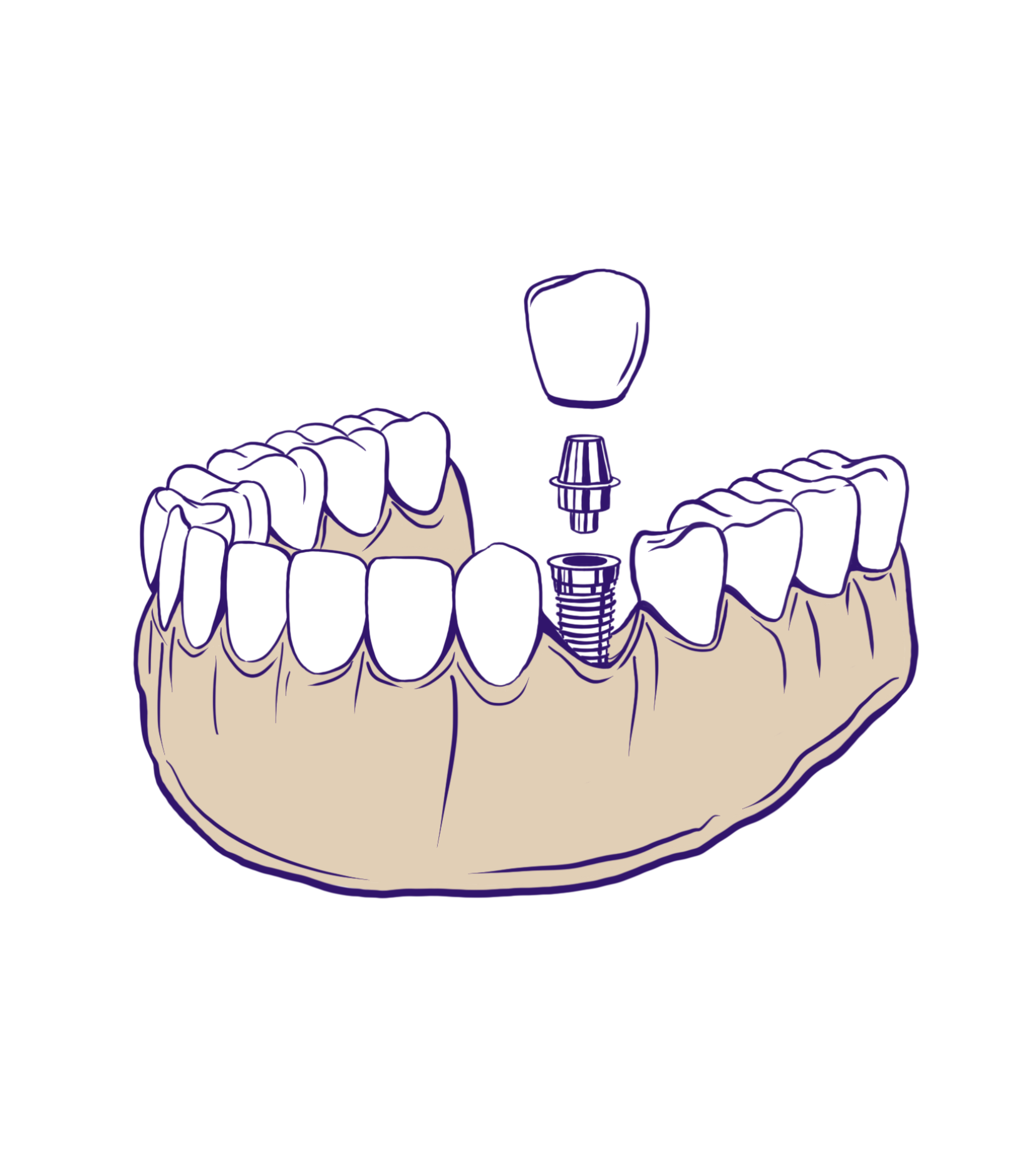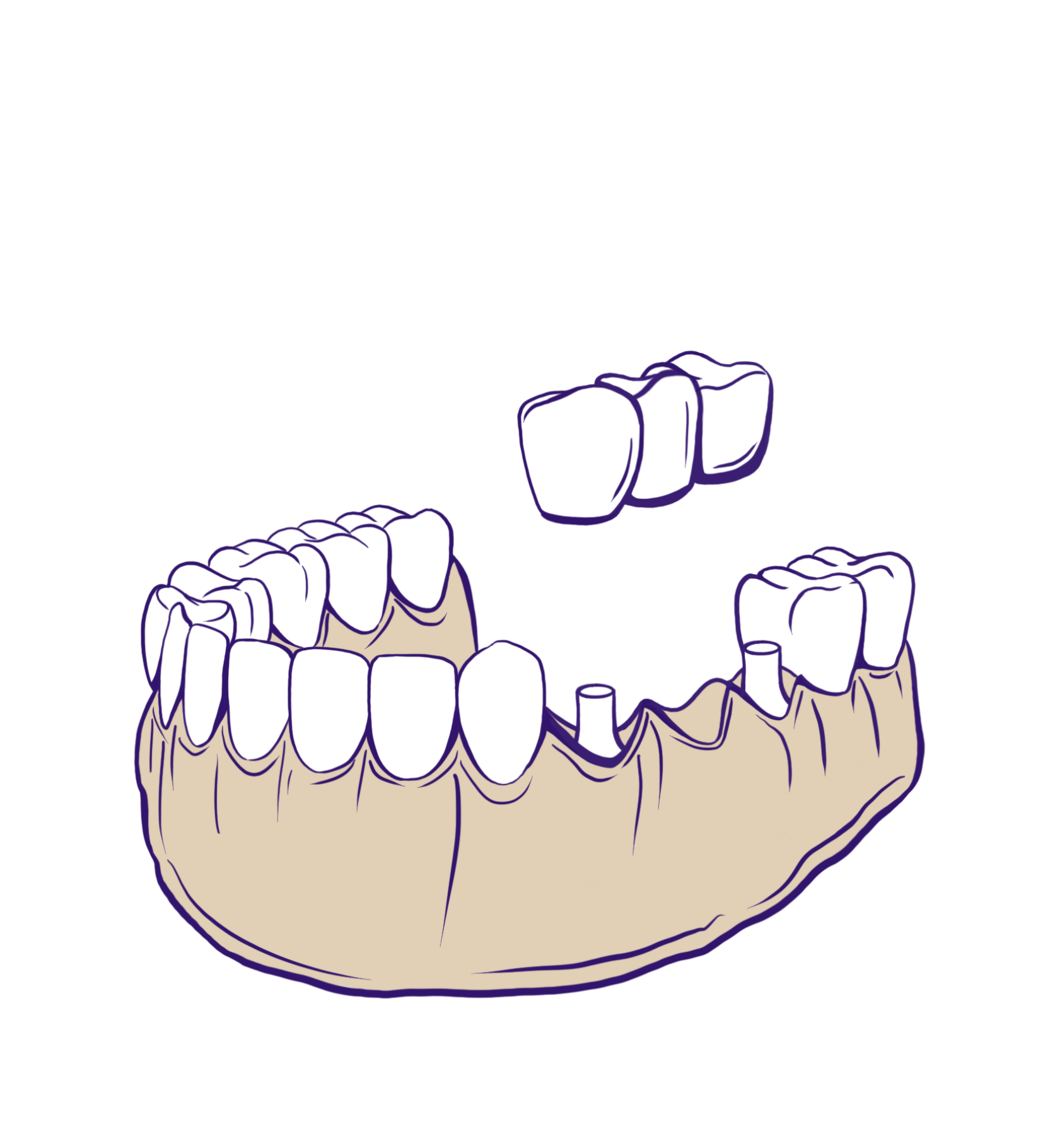Account
Help
Dental Implants vs
Bridges
Which one to choose?
You can opt for bridges or implants to address oral issues such as tooth loss. Both are common treatments with distinct technicalities and thus it is key that you know about the two to make an informed choice. Let us take you through it


Dental implants: step by step
Surgical Placement of Implant
Healing
Placing Abutment
Choosing your new Artificial Teeth

Dental Bridges: Step by step
Preparation of adjacent teeth
Bridge construction
Bridge placement
Once the mould is received by your dentist, the bridge will be cemented in the empty space and the crowns on the adjacent teeth.
Bridges vs Dental implants
Dental bridges
Non-invasive procedure
Usually lower upfront costs
Needs to be replaced every 4 to 6 years
Quick solution for missing teeth
Dental Implants
Requires minor surgical steps since implants are permanent
Same care as natural teeth
Looks and functions like natural teeth
One-time investment. Preserves facial structure and jaw bones
Permanent and sturdy
Looking to start your Bridges or Implants treatment?
Frequently asked questions
01
What is better a bridge or implant?
The better option between a bridge and an implant depends on several factors, including:
- Mouth structure: Implants require a sufficient amount of healthy jawbone to support the implant, while bridges can be attached to remaining natural teeth.
- Lifestyle: Implants are considered a permanent solution and require a commitment to good oral hygiene. Bridges may be a better option for individuals who have difficulty maintaining oral hygiene.
- Cost: Implants tend to be more expensive upfront, but can last longer and are considered a more long-term solution. Bridges are typically less expensive but may need to be replaced or re-cemented in the future.
- Time: The placement of an implant usually requires multiple visits over several months, while bridges can often be placed in a single visit.
A dentist can help determine the best option based on an individual's specific needs and circumstances.
02
Are implants stronger than a bridge?
Yes, dental implants are generally stronger than bridges.
Implants are designed to replace the root of a missing tooth and are securely anchored into the jawbone, making them a sturdy foundation for a replacement tooth.
Bridges, on the other hand, are supported by the surrounding natural teeth, which can put pressure on these teeth and increase the risk of future decay or gum disease.
Regular maintenance and good oral hygiene can help ensure the longevity and strength of both options.
03
Which is less painful bridge or implant?
Placement of a dental bridge typically involves reshaping or removing some of the natural teeth, which can cause some discomfort or pain during and after the procedure. Pain can also occur if the bridge does not fit properly or if the surrounding teeth and gums are affected by decay or gum disease.
Placement of dental implants involves a surgical procedure to insert the implant into the jawbone, which can cause some discomfort or pain during and after the procedure.
Pain can also occur if the implant does not heal properly or if there is any damage to the surrounding tissues.
Pain can typically be managed with over-the-counter pain relievers or prescription medication. A dentist can provide specific recommendations for managing pain after either procedure.
04
Who is not a candidate for dental implants?
Dental implants are not recommended for individuals with:
- Active gum disease or infection
- Insufficient jawbone density or structure
- Chronic illnesses that affect bone healing (such as diabetes or osteoporosis)
- Heavy smoking or alcohol consumption
- Uncontrolled chronic medical conditions (such as uncontrolled diabetes or cancer)
- A history of radiation therapy to the jaw
- Pregnant women.
05
Who is not a good candidate for a dental bridge?
Individuals who may not be good candidates for a dental bridge include:
- Those with limited or insufficient natural teeth remaining to support the bridge
- Those with active gum disease or infection
- Those with a weak or brittle jawbone structure
- Those who are heavy smokers or consume a lot of alcohol
- Those who have uncontrolled chronic medical conditions (such as uncontrolled diabetes or cancer)
- Those who have received radiation therapy to the jaw
- Those who are pregnant or have recently given birth.
06
Does a permanent bridge feel natural?
A permanent dental bridge can feel similar to natural teeth, but it may take time to adjust to the feel of the bridge. The degree to which a bridge feels natural can also depend on the quality of the materials used, the skill of the dental professional who places the bridge, and the individual's own ability to adapt to the new appliance.07
Why get a bridge instead of an implant?
There are several reasons why a person may choose a dental bridge instead of an implant, including:
- Cost: Bridges are typically less expensive upfront compared to implants.
- Time: Bridges can often be placed in a single visit, while the placement of an implant typically requires multiple visits over several months.
- Mouth structure: Implants require a sufficient amount of healthy jawbone to support the implant, while bridges can be attached to remaining natural teeth. Some individuals may not have enough jawbone or may not be candidates for a bone graft, making a bridge a better option.
- Health conditions: Individuals with certain health conditions, such as uncontrolled diabetes or a history of radiation therapy to the jaw, may not be good candidates for an implant.
- Lifestyle: Bridges may be a better option for individuals who have difficulty maintaining oral hygiene or who may not want a permanent solution
08
Can a dental bridge last 30 years?
Yes, it is possible for a dental bridge to last 30 years or more with proper care and maintenance09
What is the cost difference between a bridge and an implant?
Typically, dental bridges tend to be less expensive upfront compared to dental implants. The average cost of a dental bridge can range from 50,0000 to 1,50,000 while the average cost of a single dental implant can range from 50,0000 to 1,50,000 or more.Dentists behind your smile
At Dezy, our experts are trained to provide care and comfort for a pain-free treatment. Handpicked by renowned clinicians, every member of our team has a minimum of seven years of experience to ensure you’re in good hands.

4.7
Average patient rating

20+
Awards and Recognitions

500+
Years of Collective Experience
